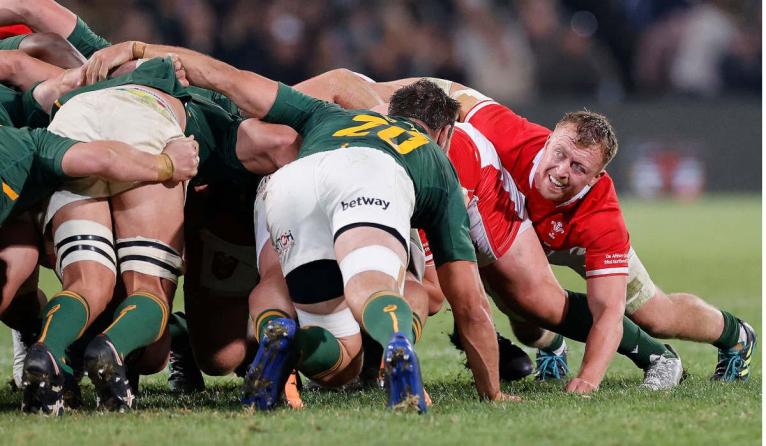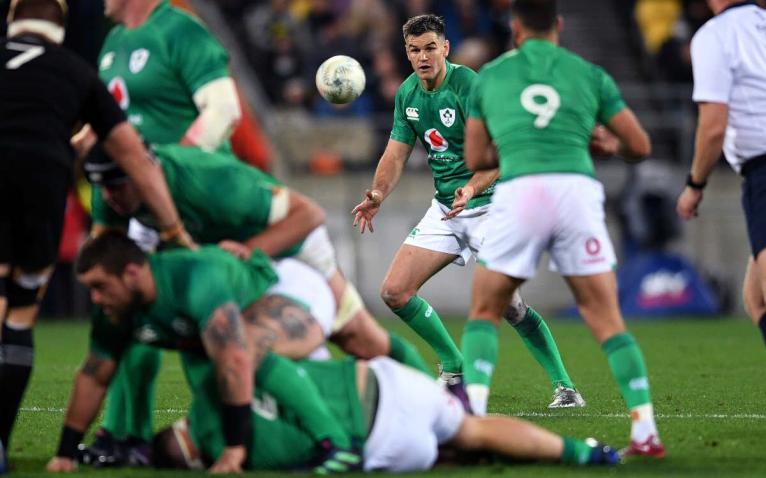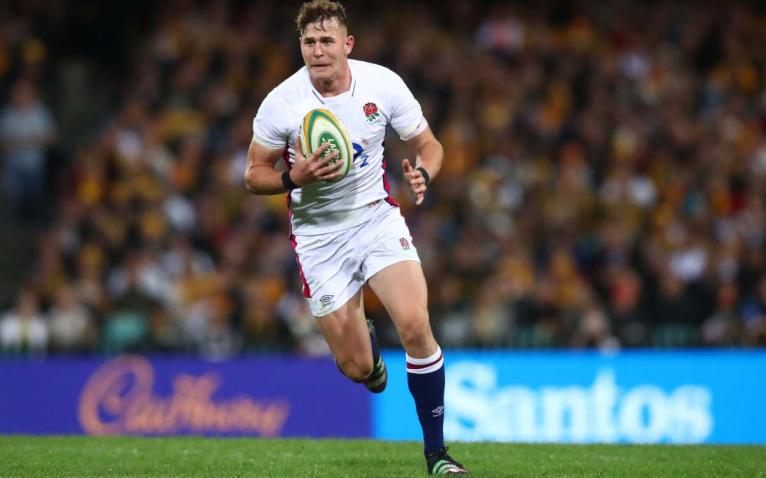A tumultuous July window of ebbs and flows has ended, the tourists are heading home, and the mammoth northern hemisphere season finishes at last.
Each series delivered in spades. Individuals proved themselves as the Test competitors. Teams were asked major questions and forced to come up with the answers.
After three blockbusting weekends, this is the RugbyPass+ world XV, picked solely on performances this month.
1. Ellis Genge (England)
Have you ever seen 110KG of Fijian beef sat on its backside? Us neither, until Ellis Genge invited the titanic Samu Kerevi to take a seat in Sydney on Saturday. Having helped Leicester roar to the Premiership title, Genge is playing the rugby of his life right now. His work rate is unrelenting, the destructiveness of his carries awesome, and he formed a key part of an England scrum which dominated over the course of the series. A rip-roaring month.
2. Dewi Lake (Wales)
A coming-of-age tour for the Ospreys hooker. Lake followed a standout club campaign with some terrific, all-action performances against the most feared pack in the game. An explosive carrier who thrived in the trenches and scored what very nearly proved a match-winning try in the first Test. Throwing remains a gnawing work-on, but what a future the 23-year-old has ahead of him.
A notable mention for Dan Sheehan whose performance in the third Test was of highest order.
3. Tadhg Furlong (Ireland)
The ‘Jukebox’ kept rolling out the hits in New Zealand. For a huge man, Furlong has some engine on him and will regularly trundle past the 60 minute mark for Ireland. His soft skills belie that of a 20st tighthead, but his passing off both hands doesn’t look out of place in broken-field play, and he hits rucks and smithereens errant opposition players like a dump truck clearing out the rubbish. His record against the All Blacks stands at five wins and one draw and four losses. A once-in-a-generation player.

4. Tadhg Beirne (Ireland)
It was tempting to forego this world XV concept and simply pick an entire team of Tadhg Beirnes, for there were surely at least four of him out there in Wellington on Saturday. His sheer, unrelenting omnipotence checked All Blacks momentum at pivotal times, over and over. A superbly read interception, a monster jackal, a morale-sapping carry. Beirne continues to burnish his reputation as one of rugby’s most effective forwards.
5. Eben Etzebeth (South Africa)
The South African colossus became the youngest 100-cap Springbok on Saturday, while still at the peak of his powers, a few months short of his 31st birthday. Etzebeth, predictably, was brilliant against Wales, winning the man of the match award in the final Test. His consistency is almost as exceptional as his brutality, as witnessed when he poleaxed Kieran Hardy, who could only wince as he hit the turf. As he returns home with the Sharks, his workload will lessen, his body can rest easier, and the Boks will get even more out of him.
6. Peter O’Mahony (Ireland)
Perhaps the enduring image of Ireland’s astonishing series win is that of O’Mahony at full-time in the third Test, his perma-scowl dissolving into tears. One by one, team-mates came forth to embrace their warrior. Each of them knew the magnitude of O’Mahony’s contribution.
This snarling epitome of Irish aggression was a beast in New Zealand. He stood astride this series as an emperor gazes down upon land he has conquered. Excellent in the murky depths of breakdown, his 50-22 in the second Test triumph will live long in the memory. Every team needs an O’Mahony; few are lucky to have one.
Elsewhere, Courtney Lawes was immense as England’s captain while Rory Darge shone in Scotland’s final two Tests.
7. Tommy Reffell (Wales)
As baptisms go, they don’t come much fierier than a gruelling summer jaunt around the world champions’ backyard. Especially if you’re a flanker. But ‘Tommy Turnover’ starred in South Africa, a constant menace over ball against the Springboks juggernauts. He made telling hits, punishing carries and was superb on the deck, living up to the entirely justified moniker. Wales do not want for quality opensides, but with three such fine Test performances, and a Premiership medal around his neck, the Leicester Tiger will be fiendishly hard to unseat.
Josh van der Flier maintained his exceptionally high standards.

8. Ardie Savea (New Zealand)
Playing out of position due to Ian Foster’s choice of captain, Savea almost single-handedly hauled New Zealand back into contention in that third Test. It was a mighty showing of dynamism and defiance from a player whose levels never seem to drop while those of so many other All Blacks fluctuate. Savea bagged a double in the heavy first-Test win, and only administrative confusion as players were sin-binned, red-carded and invalided out denied him a bigger role in the second. He remains New Zealand’s beating heart.
Billy Vunipola emerged with great credit from his return to the international arena.
9. Jamison Gibson-Park (Ireland)
Such pressure rests on the shoulders of exiled Kiwis, wearing the jersey of another nation, who return to take on the All Blacks. Gibson-Park, Bundee Aki and Robbie Henshaw were among Ireland’s foremost performers. Gibson-Park, in particular, dictated play beautifully in the second and third Tests, the accuracy and intelligence of his kicking game winning Ireland important territory, and his distribution slick.
Much was made of Danny Care’s long-awaited return to England duty, but it was Jack van Poortvliet who made a bigger splash down under.
10. Johnny Sexton (Ireland)
A rugby marvel. Sexton should not be playing this well at 37. Arguably, he should not be playing Test rugby at all, never mind captaining one of the world’s top teams at fly-half. His influence on Andy Farrell’s men is seismic; his ability to read and manipulate a game virtually unmatched. How often Sexton prises open a gap before putting someone through it, or ghosting in himself. His huge force of personality hauls Ireland forth too. A special triumph for a special player.

11. James Lowe (Ireland)
Lowe may not be as jet-heeled as some electric wingers, but at 6ft 2ins and nearly 17st, he is very difficult to haul down when he’s on the charge. Where he is absolutely vital to Ireland is with his enormous left-boot, which is regularly used to clear the lines when under pressure. Criticised for his defence in the past, Lowe has tightened up that side of his game. Another aspect of his game to like is he never goes missing in games and will regularly come infield looking for work.
12. Samu Kerevi (Australia)
Kerevi arguably nudged ahead of Damien de Allende for the world’s most destructive inside-centre in the three Test Series with England. The 28-year-old is well-acquainted with Eddie Jones after working together at Suntory Goliath, but that didn’t mean the England coach had a worthy plan to stop the Fijian-born midfielder from repeatedly smashing over the gainline, where he would invariably trample over Marcus Smith. Kerevi wasn’t purely a smash-it-up merchant either. An improved and varied kicking game saw him hoofing the ball back into England territory and his handling was also out of the top-drawer. Worth his weight in green and gold, and indispensable for the Wallabies.
13. Lukhanyo Am (South Africa)
Am only played in two of the three Tests as South Africa made a controversial 14-changes for the Test in Bloemfontein, the Shark was nevertheless class personified whenever he touched the ball. A searing move which led to Am crossing the whitewash in the third Test was only pulled back due to a forward pass and his pinpoint cross kick to Makazole Mapimpi showcased his all-round game. He had a mighty tussle with the excellent George North and emerged in credit.
Robbie Henshaw, when he moved out to 13, never let his standards drop and is worth an honourable mention.
14. Louis Rees-Zammit (Wales)
After hitting a bump in the road during the Six Nations, Rees-Zammit has returned to Test rugby with a bang. Two tries in the second Test, where he showed his rapier speed, kept the scoreboard ticking over, but it was his all-round game that impressed. The Gloucester wing has become more astute positionally, his defence and ability over the ball have improved ten-fold and he is becoming a better footballer, with his kicking from hand and deft kicks behind opposition defences, including a sublime left-footed grubber in the third Test. He’s turning into the complete wing.
A honourable mention also goes to Marika Koroibete whose workmate and power in the contact was of the highest order.

15. Freddie Steward (England)
Barring a dramatic loss of form, it is hard to see Freddie Steward will not the last line of defence for England at the Rugby World Cup, which is remarkable for a 21-year-old. The Leicester Tiger was consistency personified out in Australia. A try-scorer in the first and third Test, the 6ft 5in full-back regularly rose to the skies to pick out a fast descending ball in amongst heavy traffic and recycled. No one would be surprised to see Steward become a test centurion for England.



it should be:
1) Taniela Toupou
2) Malcolm Marx
3) Tadgh Furlong
4) Eben Etzebeth
5) Sam Jeffries
6) Courtney Lawes
7) Lewis Ludlam
8) Duane Vermeulen
9) Danny Care
10) Richie Mo'unga
11) Rupeni Caucaunibuca
12) Samu Kerevi
13) Rupeni Caucaunibuca
14) Marika Koroibete
15) Henry Arundell
This selection is a bit of a joke to be quite honest